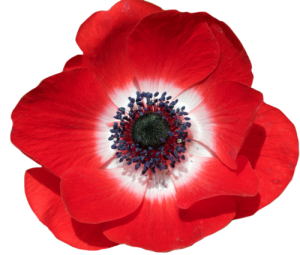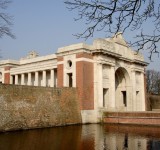Personal Details
Thomas Henry Rivers Bulkeley, born in Oak Cottage, New Woodhouse, Whitchurch, Shropshire on 23 June 1876, the eldest son of Col Charles Rivers Bulkeley and the late Constance Clementine Bulkeley of the same address.
Husband of Annie Evelyn, Lady of Grace of St John of Jerusalem, formerly Lady in Waiting to HRH The Duchess of Connaught and father to Robert Henry Arthur Rivers (born 16 January 1914), residing at 27 St James’ Court, Buckingham Gate, London.
Educated at Eton, Thomas served in the South African War, being mentioned in despatches three times. He was wounded at Belmont. He was awarded the Queen’s Medal with 6 clasps and the King’s Medal with 2 clasps.
Thomas served as Aide de Camp and Equerry to HRH The Duke of Connaught and Strathearn when he was Governor General in Canada, resigning his position to resume active service on the outbreak of WW1.
Thomas’s younger brother, Captain Charles Ivor Rivers Bulkeley was also killed in the Great War.
Military Details
Regiment : 2nd Battalion Scots Guards
Rank : Captain
Service Number :
Killed in Action; Belgium 22 October 1914 Aged 35
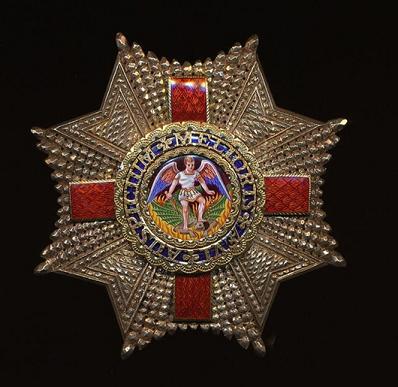
The Most Distinguished Order of Saint Michael and Saint George is a British order of chivalry founded on 28 April 1818 by George, Prince Regent, later King George IV, while he was acting as regent for his father, King George III.
It is named in honour of two military saints, St Michael and St George.
The Order of St Michael and St George was originally awarded to those holding commands or high position in the Mediterranean territories acquired in the Napoleonic Wars, and was subsequently extended to holders of similar office or position in other territories of the British Empire. It is at present awarded to men and women who hold high office or who render extraordinary or important non-military service in a foreign country, and can also be conferred for important or loyal service in relation to foreign and Commonwealth affairs.
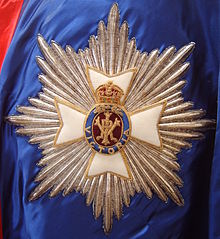
The Royal Victorian Order is a dynastic order of knighthood established in 1896 by Queen Victoria. It recognises distinguished personal service to the monarch of the Commonwealth realms, members of the monarch's family, or to any viceroy or senior representative of the monarch. The present monarch, Queen Elizabeth II, is the Sovereign of the order, its motto is Victoria, and its official day is 20 June. The order's chapel is the Savoy Chapel in London.
There are no limits on the number honoured, and admission remains at the sole discretion of the monarch, with each of the order's five grades and one medal with three levels representing different levels of service. While all those honoured may use the prescribed styles of the order—the top two grades grant titles of knighthood, and all grades accord distinct post-nominal letters—the Royal Victorian Order's precedence amongst other honours differs from realm to realm and admission to some grades may be barred to citizens of those realms by government policy.
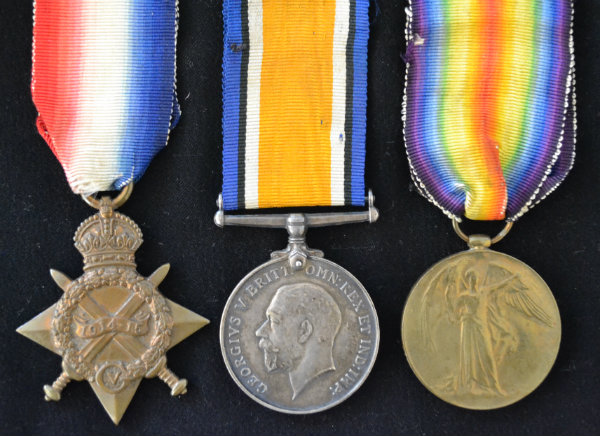
The 1914 Star (also known as 'Pip') was authorised under Special Army Order no. 350 in November 1917 and by an Admiralty Fleet Order in 1918, for award to officers and men of the British and Indian Expeditionary Forces who served in France or Belgium between 5 August and midnight of 22–23 November 1914. The former date is the day after Britain's declaration of war against the Central Powers, and the closing date marks the end of the First Battle of Ypres.
The 1914–15 Star (also known as 'Pip') was instituted in December 1918 and was awarded to officers and men of British and Imperial forces who served against the Central European Powers in any theatre of the Great War between 5 August 1914 and 31 December 1915. The period of eligibility was prior to the introduction of the Military Service Act 1916, which instituted conscription in Britain.
The British War Medal (also known as 'Squeak') was a silver or bronze medal awarded to officers and men of the British and Imperial Forces who either entered a theatre of war or entered service overseas between 5th August 1914 and 11th November 1918 inclusive. This was later extended to services in Russia, Siberia and some other areas in 1919 and 1920. Approximately 6.5 million British War Medals were issued. Approximately 6.4 million of these were the silver versions of this medal. Around 110,000 of a bronze version were issued mainly to Chinese, Maltese and Indian Labour Corps. The front (obv or obverse) of the medal depicts the head of George V. The recipient's service number, rank, name and unit was impressed on the rim.
The Allied Victory Medal (also known as 'Wilfred') was issued by each of the allies. It was decided that each of the allies should each issue their own bronze victory medal with a similar design, similar equivalent wording and identical ribbon. The British medal was designed by W. McMillan. The front depicts a winged classical figure representing victory. Approximately 5.7 million victory medals were issued. Interestingly, eligibility for this medal was more restrictive and not everyone who received the British War Medal ('Squeak') also received the Victory Medal ('Wilfred'). However, in general, all recipients of 'Wilfred' also received 'Squeak' and all recipients of The 1914 Star or The 1914/1915 Star (also known as 'Pip') also received both 'Squeak' and 'Wilfred'. The recipient's service number, rank, name and unit was impressed on the rim.
Further Information
Report in The Scotsman 28 October 1914 regarding the death of Thomas Henry Rivers Bulkeley
“SCOTS GUARDS OFFICER KILLED: Captain Thomas Henry Rivers Bulkeley, C.M.G., M.V.O., Scots Guards (killed), was a son of Lieutenant-Colonel Bulkeley, C.B. Educated at Eton, he joined the Oxford Militia in 1894, and was promoted captain three years later. Joining the Scots Guards in 1899, he became captain in 1904, and saw service in South Africa, for which he had the Queen’s medal and six clasps, and the King’s medal and two clasps. He was wounded at Belmont, and three times mentioned in dispatches. In 1904-05 he acted as A.D.C. to Lord Curzon, Viveroy of India; from 1905 to 1907 was Comptroller of the Household, and A.D.C. to Lord Minto, Viceroy of India; equerry to the Duke of Connaught, and Comptroller to His Royal Highness’s Household in Canada since 1911. He was also A.D.C. to the Duke of Connaught, Inspector-General of the Forces in 1907, and when Commanding-in-Chief and High Commissioner in the Mediterranean from 1907 to 1909. Captain Bulkeley was born in 1876, and last year married Evelyn Pelly, daughter of Lady Lilian Yorke and the late Sir Henry Pelly.”
The Scotsman 28 October 1914
Report in the Staffordshire Advertiser 31 October 1914 regarding the death of Thomas Henry Rivers Bulkeley
“News has been received that Capt. Thomas Henry Rivers Bulkeley, C.M.G., M.V.O., Scots Guards has been killed in action. Capt. Bulkeley was until recently Equerry to the Duke of Connaught and Comptroller to His Royal Highness’s Household in Canada, and returned from Canada to rejoin his regiment only a month ago. Born on June 23, 1876, he was the oldest son of Lieutenant-Colonel Bulkeley, C.B. of Oak Cottage, Whitchurch, Shropshire, who managed the late Empress of Austria’s stud at Combermere Abbey, Cheshire. He was educated at Eton and joined the Oxford Militia in 1894, receiving his commission in the Scots Guards in January 1899, being gazetted Captain in July, 1904. Capt. Bulkeley served in the South African war. He was wounded at Belmont, thrice mentioned in despatches and receiving the Queen’s medal with six clasps, and the King’s medal with two clasps. Last year the late officer married in London Miss Evelyn Pelly, lady-in-waiting to the Duchess of Connaught, and daughter of Lady Lilian Yorke and the late Sir Henry Pelly, by whom he leaves an infant son”
Staffordshire Advertiser 31 October 1914
Report in the Nantwich Guardian 30 October 1914 regarding the death of Thomas Henry Rivers Bulkeley
“Capt. Thomas Henry Rivers Bulkeley, C.M.G., M.V.O. of the Scots Guards, who has been killed in action, was until recently Equerry to the Duke of Connaught. Born in 1876, he got his commission in the Scots Guards from the Militia in 1899. From 1901 to 1904 he served as adjutant of his regiment, and in the latter year obtained his company (sic ‘commission’). For some years he was the A.D.C. and Comptroller of the Household to Lord Curzon of Kedleston, and Lord Minto, when viceroys in India.
In October 1909 , he became Equerry to the Duke of Connaught – a post he filled until the outbreak of war. In the South African war he took part in the advance on Kimberley, including the action at Belmont, in which he was slightly wounded. He was also at Paardeberg, Poplar Grove, Drienfontein, Johannesberg, Pretoria and Diamond Hill. His services were mentioned three times in despatches and he received both medals with eight clasps.
Capt. Bulkeley married, in April 1913, Annie Evelyn (formerly Lady-in-waiting to the Duchess of Connaught), elder daughter of Sir H.C. Pelly, Bt. He leaves an infant son.
Deep regret has been occasioned in Cheshire and Shropshire by the news of the death. Captain Bulkeley was son of Colonel C. Rivers Bulkeley, of Oak Cottage, Whitchurch, and was well known in local hunting circles.”Staffordshire Advertiser 31 October 1914
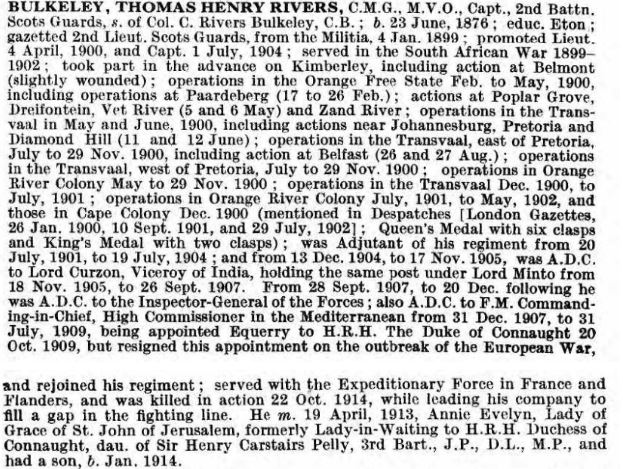
Taken from Forces War Records
Taken from Forces War Records
If you can provide any further information on Thomas Henry Rivers Bulkeley please get in touch by leaving a comment below, using our Contact Form or by calling in to Whitchurch Heritage Centre.
Information provided by Whitchurch Museum and Archives

